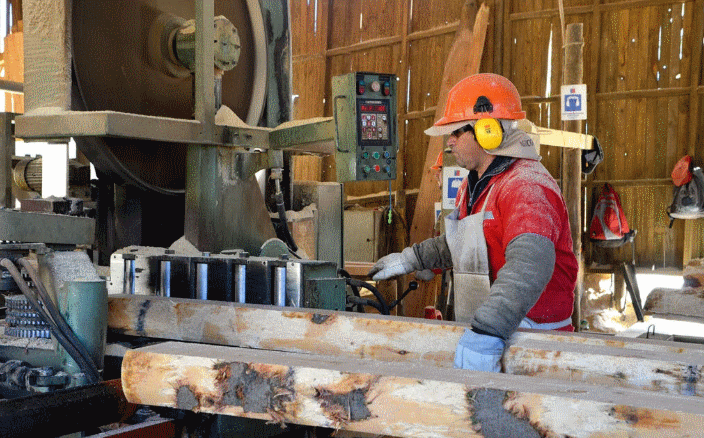There is concern both in the Biobío region and nationally about the sustained closure of sawmills in recent years, particularly those belonging to small and medium-sized entrepreneurs.
According to data from the Forestry Institute (Infor), nearly 200 sawmills have closed their doors in Chile over the last five years, representing more than 25% of the total. In this context, the hardest-hit region is precisely Biobío, which concentrates the majority of the country's forestry plants and SMEs.
"This is not a minor problem. The forestry sector is experiencing a crisis that mainly affects small and medium-sized sawmills. If they continue to close, the entire productive ecosystem will be weakened, including large companies," warned Michel Esquerré, president of Pymemad, the guild that brings together small and medium-sized timber enterprises (SMEs).
SUSTAINED PROCESS
In the Biobío region, the closure of sawmills has become a recurring situation in recent years. Just between 2020 and 2023, around 20 plants permanently closed their doors, leaving behind not only empty structures but also families who directly depended on that source of employment.
It is not a sudden situation. Since 2010 onwards, the figures show a constant downward trend in employment within the primary forestry industry. Back then, the sector employed about 15,160 workers. Thirteen years later, in 2023, that number had fallen to 9,889, marking a sustained decline that hits hard a region that has historically lived off timber.
THE REASONS FOR THE DECLINE
The reduction is not only due to a competitiveness problem in international markets but also to the effects of forest fires, changes in demand, and the lack of technological renewal in several of the region's sawmills.
Michel Esquerré pointed to several causes. The first is historical: "Since 2010, support for small and medium-sized forest owners was discontinued. The State used to invest in plantations and would recover the investment several times over in the long term, but that was abandoned."
To this is added the lack of modernization in the classification of SMEs. Today, a local company that invoices $3,000 million per year and employs about a hundred people is placed in the same category as a large company that moves billions of dollars and has tens of thousands of workers. "That is absurd, as it distorts the entire system and leaves SMEs without tools," he stated.
Other factors are the absence of robust productive chains, the short-term focus in policy —in a sector where trees are planted with the understanding that it takes approximately 20 years for them to grow before they can be commercialized— and the devastation left by fires in forests owned by small and medium-sized landowners.
TIMBER THEFT AND SECURITY
Regarding timber theft, which for years was one of the sector's headaches, the guild assured that it is no longer a serious issue today.
"Timber theft has decreased by 97%. Controls, traceability, geofencing, electronic guides, and GPS in trucks have been implemented. Today, the forestry sector is one of the most traceable in the country, even more so than agriculture," stated Esquerré.
URGENT CALL TO THE STATE
A clear call was made from Pymemad to modernize forestry policy, strengthen the classification of SMEs, and support small landowners.
"The abandonment of small and medium-sized forest owners is lamentable. They have no means to invest or to insure their plantations against fires. If the State supports them, it's a win-win for everyone: jobs are created, the land is cared for, and more revenue is collected in the future," emphasized Esquerré.
To this is added another problem: the increase in costs due to new labor and compliance laws which, although well-intentioned, hit SMEs harder as they cannot pass on the expenses to prices, unlike large conglomerates.
"In the end, what ends up happening is more economic concentration. And Chile is already a country that is too concentrated," concluded the guild representative.
A LOOK AT THE SECTOR'S FUTURE
The forestry sector, they remind from Pymemad, is key for the economy and also for the fight against climate change.
"Planting trees is one of the most effective instruments for decarbonization. But if we let the SMEs die, we weaken the entire forestry ecosystem. It is urgent to modernize the classification system and give breathing room to medium-sized companies, which are fundamental for the country's future," they concluded.
Source:La Tribuna







Comments (0)
No comments yet. Be the first to comment!
Leave a comment